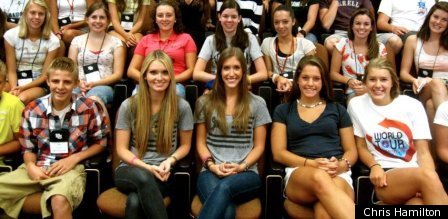
Gossip, rumors, backstabbing, betrayal, love triangles, drama, jealousy and manipulation. No, this isn’t an episode of Gossip Girl. It’s the real “girl world,” where girls bully one another mercilessly, regardless of whether their target is a friend, an enemy or worse -- the dreaded frenemie. It’s a place where girls stay home from school pretending to be sick because they can’t face being picked on in the hallways, where in the blink of an eye a girl’s best friend will turn on her, and where everyone is targeted for being too fat, too ugly, too slutty, or too pretty. Filmmakers and anti-bullying activists Lauren Parsekian and Molly Stroud know this world well. After experiencing the pain of girl bullying first-hand, the two friends started The Kind Campaign to raise awareness and foster an ethos of kindness between girls and women. The recently-released documentary Finding Kind -- which won Best Film at the Palm Beach International Women’s Film Festival -- chronicles the journey of their cross-country, kind-spreading road trip. Armed with a van, their mothers, and a single cameraman, Parsekian and Stroud spent six weeks visiting schools across the country and speaking with hundreds of girls about bullying and abuse in female relationships.
What they found is that the experience of girl bullying is a nearly universal one, and that its impacts can last a lifetime. According to Parsekian, “We’ve sat down with women in their fifties with families and careers who, within five minutes of telling their stories, can recall every single detail from an experience in sixth grade and are in tears about it.” I caught up with the best friends-turned-goodness-spreaders to discuss the mean girl phenomenon -- and what they’re doing to put a stop to it.
You spent six weeks touring the country, visiting schools and speaking to girls about their experiences with bullying. What sort of responses were you getting from these girls?
Molly Stroud: There were so many times that Lauren and I looked at each other and were just in awe of the way that the girls in the assemblies responded to the interactive features that we were doing with them and our message. That’s what keeps us going and what keeps us doing Kind Campaign. At an assembly that we did up in Oxnard, CA for about 2,000 girls, we had girls coming up and apologizing to each other in front of their peers, which can be a really scary thing. Tears were shed, hugs were happening all over the place, and friendships were mended. It was an unbelievable experience.

What were your own experiences with bullying and how did they inspire you to take on this project?
Lauren Parsekian: Going into seventh grade I was one of the popular girls in school -- whatever that means. But at a party the summer before seventh grade, two of the girls I was close with spread a rumor about me … It began there and then over the next two years they spread more rumors about me, threw things at me at lunch, got guys to ask me out and then break up with me to embarrass me, or ripped up my homework. I could go on and on, there were so many things that they did to me that were just so hurtful … Through seventh and eighth grade I was dealing with depression, which turned into an eating disorder and got to the point where I tried to take my own life. Being in that place and having that mindset, I felt that there was no way out. But that’s not the reality. We always encourage girls to know that when you’re in middle school and high school it seems like everything you’re dealing with is your entire world. It’s really hard to see outside the school halls to the bigger picture, but we want them to know that they’ll go on to have so many experiences and people and chapters of their lives.
It’s easy to paint a rather negative picture of female friendships when discussing this issue. Several of the girls interviewed say they wish they were boys, and one male interviewee even says, “I know very few women who really have friends.” Do you think that women are less successful in their friendships than men?
LP: I don’t think that’s the case -- that’s why it was really imperative to include the interview with the group of women in Jackson, Mississippi who exemplify women that do have functional friendships and how beautiful that is. They’ve been friends for 50 years. As much as we see a lot of really sad stories, we do see so many examples of amazing friendships. I think it becomes possible when we as women and girls can get through our insecurities personally because that, at the end of the day, is the root of these issues. I think that working through that and being OK with who we are is the first step.
How does technology, particularly social media, change the playing field for bullying?
LP: The role of technology is huge and it’s such a crucial part of this. With Facebook or Twitter or a text message, you write something and you don’t have someone’s face attached to it. You’re not looking someone in the eyes and seeing how what you’re saying is affecting them. It becomes so much easier because you don’t see the immediate repercussions of what you’re doing, when a lot of times the repercussions of cyberbullying are really extreme. It can be a dangerous thing, but it can also be really positive. You have the capacity to reach out to massive quantities of people, and you can use that for good. We’ve really used the Internet to create a community for our girls through our website, Facebook, and Twitter -- a place for girls to talk about this and be real with each other and support one another.
